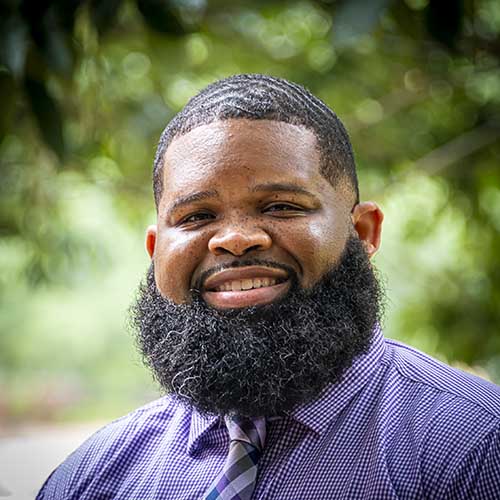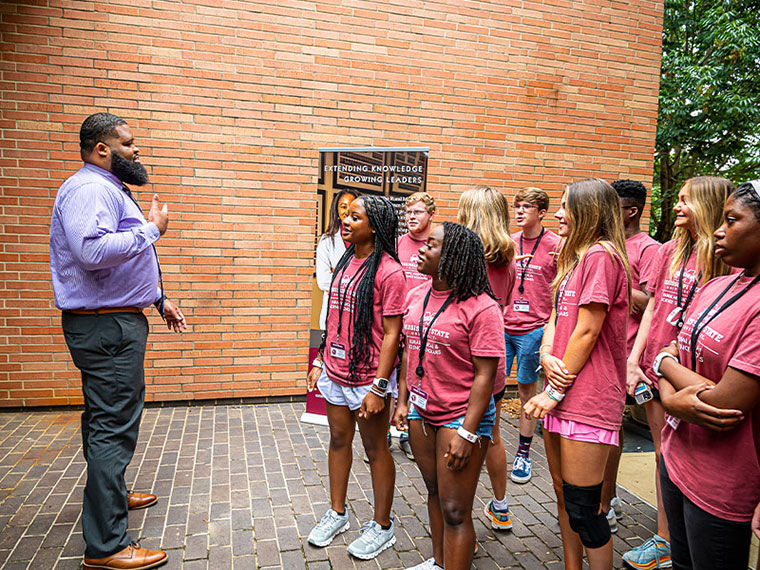The information presented on this page may be dated. It may refer to situations which have changed or people who are no longer affiliated with the university. It is archived as part of Mississippi State University's history.
Over half of Mississippi's population is rural, yet more than half of the state's doctors practice in one of its four urban centers. This widely unequal distribution of medical resources-not only physicians but also hospitals, clinics, and other facilities-results in unnecessary travel and for many, unresolved health issues. For a multitude of reasons, rural communities often lack basic health care services or dedicated doctors.
Dr. Antonio J. Gardner, associate professor in the Department of Food Science, Nutrition and Health Promotion, along with Dr. Laura Downey, former associate extension professor in the School of Human Sciences, contributed to a multi-institutional study examining the reasons that rural southern African Americans are virtually nonexistent in American medical schools.
The study, based out of the University of Alabama, specifically analyzed Alabama's Black Belt region, whose communities meet the definition of "rural" based on USDA Rural-Urban Continuum Code ratings. Having grown up in Autaugaville, Alabama, population 795, and having benefited from UA's Minority Rural Health Scholars Program, this study is close to Gardner's heart.
"Growing up, I aspired to be a physician," he said. "After my junior year of high school, I applied for the program and attended a 5-week session at the university, where I took classes for college credit, visited a medical school, and shadowed physicians."
Dr. John Wheat, lead author of the study and director of Rural Programs at the University of Alabama, had witnessed a 30-year disparity in the number of African American students participating in the university's rural pipeline programs. The pipeline programs span from a high school junior level program (Rural Health Scholars) to a pre-matriculation program which prioritizes rural health (Rural Medical Scholars Program) for entry into the Heersink School of Medicine at the University of Alabama at Birmingham. Specifically, they examined the Alabama Black Belt population, a region known historically for its rich agricultural roots and presently for its population of predominantly rural Black residents, which Gardner compared to Mississippi's Delta region.
"We really wanted to understand the barriers to success-why it was so difficult for students to engage and remain in these pipeline programs from high school through matriculation," Gardner said.
The team developed a set of discussion questions for focus groups comprised of program alumni, professionals in rural medical education, institutional partners, and rural African American students pursuing a medical degree path. They discovered patterns of social and environmental factors and institutional factors contributing to low enrollment rates for rural African American students with the desire to enter the healthcare profession.
"First generation students from rural areas often have limited resources for tuition and test prep materials for the MCAT, so they just don't think medical school is within reach," Gardner said. "And they aren't always aware of assistance programs. We need a stronger university-community pipeline, identifying mentors who can provide information and encourage these young people to explore a career in medicine."
Gardner and his colleagues also noted that, according to data from the study, the few students who are recruited and do apply to these rural programs encounter further obstacles to matriculation once they set foot on campus.
"Moving from a small community to a large college campus can be a difficult transition for these students," he said. "We need to make sure that we have the support systems in place but also hire staff who look and sound like them and can relate to rural life."
To follow up their focus group project, Gardner and his colleagues are conducting a case study following a set of African American students throughout the UA's Rural Scholars Program to further explore student successes and barriers. In the study, which follows 220 Rural Medical Scholars students over 21 years, they found that only 16 were African American, and of those African American students, nine pipeline and three general admission (75%) entered medical school. Of the students who entered medical school, seven pipeline and three general admission students (83%) matriculated successfully.
"There is still a lot of work to be done to support these students and ensure their success," he said.
Mississippi State University offers a Rural Medical and Science Scholars Program through the university's Extension Service. The College of Agriculture and Life Sciences sponsors the program, which is hosted by the Department of Food Science, Nutrition and Health Promotion. Gardner is on the advisory board and serves as a mentor in the program, coming full circle from his role as student.
"As a land-grant university, we need to think about the investments we place in our state to improve health outcomes for our citizens," he said. "Supporting a pre-medical education for a student who will go on to medical school and then return home to practice is an investment in our state's future."
This research was sponsored by the Heersink School of Medicine at the University of Alabama and the Mississippi Agricultural and Forestry Experiment Station.
As A Land-Grant University, We Need To Think About The Investments We Place In Our State To Improve Health Outcomes For Our Citizens. Supporting A Pre-Medical Education For A Student Who Will Go On To Medical School And Then Return Home To Practice Is An Investment In Our State's Future.
Dr. Antonio Gardner
Behind the Science

Antonio Gardner
Associate Professor
Education: B.S., Biology, Alabama A&M University; M.S., Human Environmental Sciences, Ph.D., Health Education and Promotion, University of Alabama Years at MSU: 6
Years At MSU: 6
Focus: Health equity for rural and African American populations
Passion At Work: I believe in meeting the people where they are to improve health outcomes and close the geographical and racial gaps that

